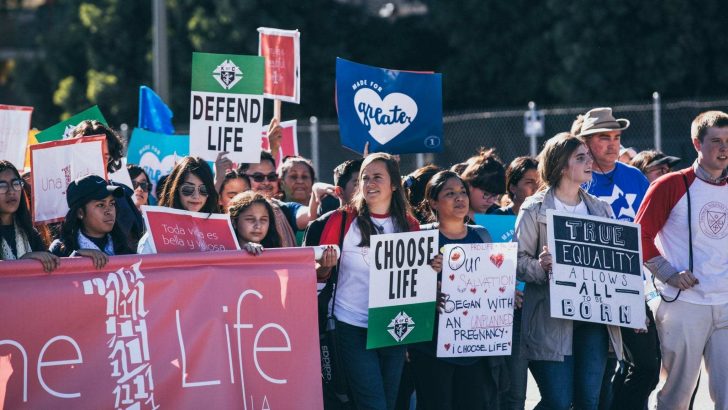Christopher White
Speaking to young people on the beaches of Rio de Janeiro at the 2013 World Youth Day, Pope Francis encouraged those present to go home and shake things up.
Perhaps one result of that was in the US where an experiment took place last month in an attempt to bridge the divide between so-called ‘pro-life Catholics’ and ‘social justice Catholics’.
For 50 years now, tens of thousands of pro-life marchers have battled the frigid January temperatures to gather on the National Mall in Washington, DC and march to the steps of the Supreme Court to mark the anniversary of Roe vs Wade, when abortion was legalised throughout the country.
The annual March for Life has long been considered the highlight of the year for the pro-life community in the US — and with the annual Vigil for Life that takes place the night before at the National Shrine each year, which is attended by scores of US bishops — the March certainly has tacit backing from the highest ranks within the US Church.
Last year it was announced that for the first time ever, the annual Catholic Social Ministry Gathering, which is organised by the US bishops and traditionally held each February, and brings together activists on a range of issues — such as immigration, climate change, the death penalty — would now be held the same weekend as the March for Life in an attempt to bring the two worlds together.
Bridge
The metaphorical bridge that was trying to be built between the two camps, however, seemed to face detonation when it was announced that President Donald Trump would become the first ever sitting president to address the March for Life in person.
President Trump has divided the US Church and the pro-life community from the earliest stages of his candidacy when he used Mexican immigrants as a political punching bag in his first speech announcing his bid for the presidency.
Yet as his 2016 campaign gained momentum and he became the inevitable nominee, single-issue-voting, pro-life Catholics hitched their wagons to his, initially with skepticism and now with enthusiasm, as many now hail him the most pro-life president the US has ever had.
For others, that moniker has been hard to reconcile with his record of separating children from their parents at the southern border and his boasting of the way in which he has treated women. Just two days after he declared that “mothers are heroes” from the stage of the March for Life, his administration announced that pregnant mothers seeking immigration visas in the US would be denied – further punctuating the hangover from his appearance at the March for Life for those wary of the fact that for all intents and purposes, he was now the face of the pro-life movement in the US.
Kicking off the Catholic Social Ministry Gathering just 24 hours after the March for Life ended, Cardinal Blase Cupich of Chicago cautioned that “the Church’s job is not to discern which political, partisan or military force we should support in order for good to triumph”, but to see Christ as the “starting point” for the Church’s ministry on every issue.
Yet his remarks weren’t a one-way criticism of Catholics who have allied themselves with a political party, but rather a warning of those who have come to see politics as a salvific vehicle for bringing about the Kingdom of God.
“Losing sight of Christ’s saving action as our point of reference, risks fragmenting our approach to social justice by giving priority to one issue or a set of issues according to our standards or worse yet, our compromises with worldly powers,” he went on to warn.
The divisions among US Catholics are no great secret, but January put on full display the frailties of what could and should be a strong, big tent coalition eager to work to protect and promote life at all stages.
Yet if the March for Life exposed the fractures that exist, some 3,000 miles away, another event perhaps offered a way forward.
For the past six years, the archdiocese of Los Angeles (LA) has reimagined its own annual pro-life initiative with its ‘One Life LA’ walk. The LA equivalent isn’t about political power, but rather, it’s focused on individual people and the places in which they live.
There’s music, food trucks, dancing, and yes, speakers, too – but the focus isn’t the political. It’s personal testimonials and is community centered, engaging local partners rather than trying to attract the attention of powerbrokers. In short, it’s a true celebration of life, which, for many at least, provides a better witness to what Catholics are for and not just against.
“Hagan Lio” were the words Pope Francis challenged young people in Rio de Janeiro. Some commentators translated it as “shake things up”, others as “make a mess” or “make some noise”. Catholics in LA have accepted that challenge. Perhaps they paint a better way forward for all of us.
Christopher White is the national correspondent for Crux and the Tablet newspaper of the diocese of Brooklyn. Follow him on Twitter @CWWhite212.


 People hold signs aloft at January's One Life LA walk in Los Angeles.
People hold signs aloft at January's One Life LA walk in Los Angeles. 